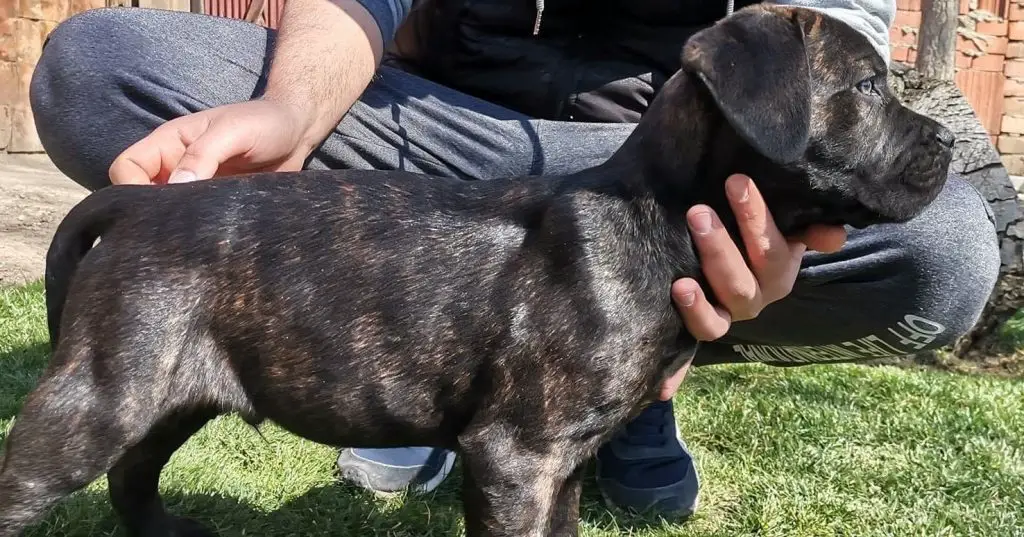A Cane Corso is a large and powerful dog that can make a great pet, but like all dogs, they need to be spayed or neutered. The decision of when to neuter a Cane Corso is an important one that should not be taken lightly.
A Cane Corso should be neutered between six and eighteen months, but most pet parents decide to do it around month nine.
In this blog post, we will discuss the pros and cons of neutering a Cane Corso at different stages in its life. We will also provide you with everything you need to know about the procedure itself.
So, whether you are just considering getting a Cane Corso, or you already have one, read on for information about when to neuter them!
Key Takeaway
- A Cane Corso should ideally be neutered between six and 18 months of age, with some recommending a tighter range of six to nine months.
- Before having your Cane Corso neutered, it’s important to ensure they are healthy and not overweight, get pre-surgical blood work done, withhold food for 12 hours prior to the surgery, and prepare a quiet and comfortable recovery space at home.
- After your Cane Corso is neutered, you should monitor their incision site for any signs of infection, restrict their activity to prevent injury, provide a calm and comfortable environment for recovery, and follow the vet’s instructions regarding pain management and wound care.
When Should a Cane Corso Be Neutered?

The best time to neuter your Cane Corso is between six and eighteen months of age. This will give them plenty of time to mature before the surgery as they get their reproductive organs around this time. Once they’re neutered, they’ll be less likely to roam, mark their territory, or try to mate. All of which can be very frustrating behaviors for owners.
Each pet parent and their veterinarian will individually determine what is the best. There are things like the dog’s health and development that need to be considered.
However, you shouldn’t get your Cane Corso neutered in the first five weeks you’ve had the dog. This time can be very stressful on their bodies as they are still getting used to their new home.
Many changes can happen in the first week of their life. Consultation with a veterinarian can be very helpful and needed. The veterinarian knows best about the dog breed and their bodies.
Evidence shows that neutering as a procedure is best to be done in the first year of the life of a Cane Corso. Studies show that neutering your dog at this time can prevent cancer in its reproductive organs as well as in other organs.
The neutering procedure is known to make dogs less aggressive and overall more calming. The calmness and decreased aggression can be very helpful for further training your Cane Corso. However, this is an individual choice for families that have a Cane Corso, as some would not do this procedure.
Related:
- 8 Strange Behaviors After Neutering Your Dog
- Is It Normal For Dogs To Swell Two Weeks After Neuter? (Answered!)
- Can a Neutered Male Dog Still Tie? (Answered!)
What Should I Do Before I Have My Cane Corso Neutered?

Before you have your Cane Corso neutered, you should take your dog to the veterinarian to see if they are in a good health, and are ready for the surgery. Before the surgery is done, your dog should be on a healthy diet and get the right amount of exercise.
It’s very important for your dog to eat a healthy diet before and after the neutering surgery is done, Eating a healthy diet will increase the chances they pass the surgery without any serious complications. However, eating an adequate and healthy diet is also important in their recovery process.
The vet will decide if the Cane Corso is ready to be neutered. If done too early, the neutering surgery can deprive the dog of sex hormones which are necessary for their maturation.
Another important thing for your dog before the neutering surgery is their sleep. They need to get a lot of sleep because sleep is vital for Cane Corso‘s overall health and wellness. A good amount of sleep beforehand will help your dog to pass through the surgery easily and to heal faster.
Keeping your household traffic to a minimum before the neutering surgery can help reduce stress on your dog.
Sleeping is known to reduce stress. As a pet parent, you need to release your dog from stress before the surgery as much as possible. This is very important because stress can weaken a dog’s immune system. So, be creative and do anything that you think can help with the stress release.
In general, make sure that your Cane Corso is overall healthy and doesn’t have a cold or anything else before the surgery. This will ensure they will recover easier, quicker, and without any serious issues says Mastiff Guide.
What Should I Be Doing After My Cane Corso Is Neutered?

After your Cane Corso has undergone neutering surgery, there are some things you need to do in order to ensure a successful recovery. First of all, it is important to keep your dog calm and quiet for at least the first 24 hours after the surgery. This means no running, jumping, or playing.
After the neutering surgery is done, they will need a short period to recover before they resume their everyday lifestyle. This can be very stressful for the Cane Corso. You can help them by getting a recovery cone that will prevent them from hurting the surgery site.
Lots of hugs, playtime, and a lot of love can help keep them from feeling stressed about the recovery cone. Basically, anything that makes your dog happy will help to smooth the recovery so they can return to their life as usual soon enough.
Give your dog plenty of time to rest and recover from the surgery. Allow him to sleep as much as he wants. Don’t try to force him to be active if he doesn’t want to be.
Keep an eye on his incision site and make sure it looks clean and dry. Contact your veterinarian if you see any signs of infection, such as redness, swelling, or discharge.
Offer your dog small amounts of food and water at first, gradually increasing the amount as he starts to feel better. It’s normal for a dog to have a decreased appetite after surgery. But he should start to eat and drink more within a day or two.
Does Neutering a Cane Corso Help With Aggression?
Neutering a Cane Corso can help reduce the amount of aggression they exhibit. Neutering removes the hormones associated with dominance and aggression and male dogs are generally less likely to engage in aggressive behaviors after being neutered.
While there is no guarantee that neutering will completely eliminate aggressive tendencies, it can often help to reduce them significantly. In addition, neutering eliminates some of the other unwanted behaviors such as marking territory, roaming, and mounting.
Overall, neutering a Cane Corso may be an effective way to lower their levels of aggression. However, it is important to note that this should always be done along with proper training and socialization in order to ensure the best outcome.
Additionally, even if your Cane Corso is neutered, it is important to monitor them and be aware of their body language so that you can intervene if they become aggressive.
Is Neutering Surgery and Recovery Difficult For a Cane Corso?
No, the neutering surgery is not difficult if the Cane Corso is overall healthy. Like many other surgeries, this surgery usually passes uneventfully, but if your dog has any health issues it needs to be considered beforehand. As far as the recovery time, it is different for all dogs.
Like all surgeries, there is always some inherent risk. However, neutering surgery is a very routine procedure that your veterinarian should have no problem performing.
The main concern with any surgery is always anesthesia and making sure your dog is healthy enough to undergo it. Other than that, the surgery itself is generally quick and easy.
If your dog is healthy and doesn’t have allergies to anything it shouldn’t have any problems with the surgery. Your dog will be in pain after the surgery. So, the surgeon will administer pain medications to help your dog get better and feel as little pain as possible.
The neutering surgery recovery time is usually ten to fourteen days but can vary for some dogs. No swimming or bathing is allowed during recovery time.
Be prepared for the roller coaster with lots of love and patience. It will help a lot if you do not invite friends or other family members into the household while your puppy is recovering. Any new faces will only make your Cane Corso anxious at times when you want them to be as calm as possible.
FAQs
Q: Why should I consider neutering my Cane Corso?
A: Neutering your Cane Corso can have numerous health and behavioral benefits. It helps to prevent unwanted litters, reduces the risk of certain cancers and urinary tract infections, and can help prevent certain behavioral issues such as aggression and marking.
Q: Does neutering a Cane Corso affect their temperament?
A: Neutering can have an impact on a dog’s temperament, but it varies from dog to dog. Generally, neutering can help reduce territorial and aggressive behaviors, but it may not dramatically change their overall temperament. It is important to note that individual temperament is influenced by genetics, socialization, and training.
Q: Will neutering my Cane Corso change their appearance?
A: Neutering a Cane Corso will not affect their physical appearance, such as their size, color, or build. However, after neutering, some dogs may develop a slightly different body shape due to changes in hormones and metabolism. These changes can potentially lead to weight gain if not properly managed through diet and exercise.
Q: Is neutering a Cane Corso a major surgery?
A: Neutering a Cane Corso involves a routine surgical procedure that is commonly performed by veterinarians. It is considered a relatively safe procedure, but it does require the dog to be placed under anesthesia. Like any surgical procedure, there are potential risks, but these are generally low when performed by a qualified veterinarian.
Q: How long does it take for a Cane Corso to recover from neutering surgery?
A: The recovery time for a Cane Corso after neutering surgery is typically around 7-10 days. During this period, it is important to restrict physical activity, prevent licking or chewing the incision site, and follow the post-operative care instructions provided by your veterinarian.
Q: Are there any risks or complications associated with neutering a Cane Corso?
A: As with any surgical procedure, there are potential risks and complications associated with neutering a Cane Corso. These can include infection, bleeding, adverse reactions to anesthesia, and complications during the healing process. However, these risks are relatively low when the procedure is performed by a skilled veterinarian.
Q: Can I still breed my Cane Corso if it has been neutered?
A: No, neutering your Cane Corso will render them unable to reproduce. Neutering involves the removal of the reproductive organs, including the testes in male dogs, which eliminates their ability to father puppies.
Q: Will neutering my Cane Corso stop them from marking their territory?
A: Neutering can help reduce the tendency for a Cane Corso to mark their territory, but it may not completely eliminate the behavior. Some male dogs may still have the instinct to mark, especially if they have established the behavior before being neutered. Consistent training and positive reinforcement can help address this behavior.
Q: How much does it cost to neuter a Cane Corso?
A: The cost of neutering a Cane Corso can vary depending on factors such as geographic location, the clinic or veterinarian performing the procedure, and any additional services or medications required. It is recommended to contact local veterinary clinics or hospitals to inquire about pricing specific to your area.
In Conclusion
Neutering a Cane Corso is best done between the ages of six and eighteen months, but most veterinarians recommend that it be done around the age of nine months.




